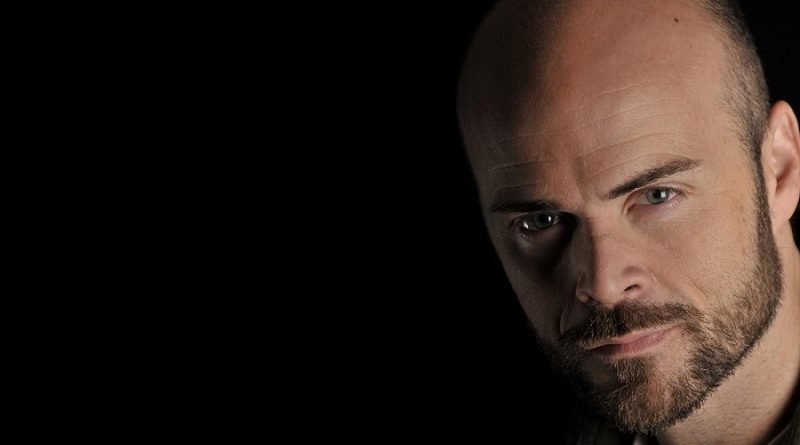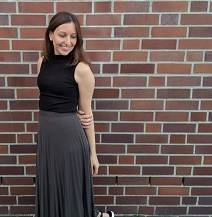Spotlight on Paul Kampf: Writer/Director Edition
In Theatre Trip’s “Spotlight On” series, we’re chatting with some of the most inspiring people in the theatre industry. And today we’re doing a special feature on Paul Kampf – a writer, director, and producer who has beautifully balanced a career spanning both the film and theatre worlds.
Paul Kampf is the director and writer of the brand-new film Imprisoned, which opened on September 13th. And we’re especially excited to feature him on Theatre Trip since he actually began his career in theatre! He has since started his own company (Breadline Theater Group) and will be returning to the stage in 2020 with his play October Surprise.
What was it that initially inspired you to pursue a career in film and theatre?
“I entered college as a music major on a percussion performance track. I loved the creative process that jazz drumming brought out in me. However, I had to attend a play on opening night as part of my general fine arts requirements. I witnessed a fictional play use real events that were deeply connected to the people around me in the audience. I was transfixed by the exchange of energy between audience and actor and was riveted by the immediacy of the event. I went back every performance that week and found that each night was its own unique journey.
Soon I auditioned for a professional company and ended up getting cast that summer. Soon afterward, the Artistic Director persuaded me to pursue acting at the University of MN, Duluth. I then went full force into the process of trying to learn the tools for the stage that so deeply impacted me as an audience member. Upon completing my degree, I accepted a scholarship for my MFA in Acting at Illinois State University, where many of Steppenwolf Theater’s founding members had emerged.
During this time, I started writing for the stage and was invited to work at London’s Famed Royal Court Theatre for a summer. Inspired, I launched my own theater company, Breadline Theater Group, with two friends and finished my graduate work after running our own repertory theater of world premiere work. This brought me and the company to Chicago. And for a decade, I continued to act, write and direct original work for the stage.
After adapting my stage play, American Gothic, into a screenplay (Brothers Three) I soon found the script was garnering attention around Hollywood. It was time to put together the financing and cast the film. My experience in theater taught me how much work it is to build something from scratch, but with film it was on a much bigger scale. Within six months, I was behind the camera directing John Heard, Patrick Wilson and Neal McDonough – all great actors who’d all built their career from the stage. It was this first experience that taught me that my approach would be rooted in my theater experience and that I was at my best when I was able to work with actors that valued a similar process.”
“An actor must find his or her authenticity, build the imagination and learn the simplest means to communicating the largest ideas.”
Can you tell us a bit about your new film, Imprisoned, and what inspired this project?
“Imprisoned is starring Laurence Fishburne, Juan Pablo Raba, Juana Acosta and featuring Esai Morales, Edward James Olmos, Jon Huertas and John Heard in his final role. It was first inspired by some volunteer work I’d done in the Cook County Penal System in my early Chicago years. I was impacted by the desire to express themselves that I saw in the men taking my workshops. They all had a deep desire to communicate, but no tools our outlet to do so. Without a safe space, it was clear many of these men were making choices in their lives based on their limited access to self awareness and understanding. Thee conversations we had about justice, forgiveness, hope and paying one’s debt to society planted the seed of the story that ended up being the film, Imprisoned.”
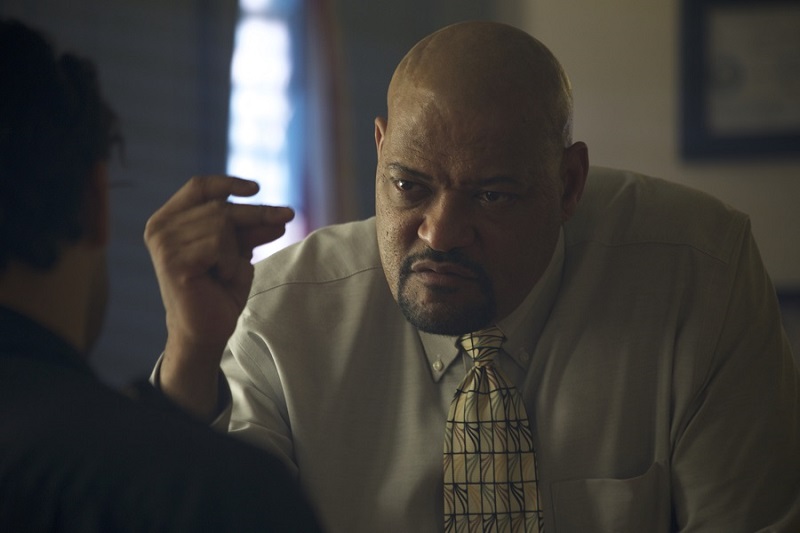
“The film asks a very important question: Are we who we are today or are we stuck in our past? Dylan has made mistakes, but has paid his debt to society and has built a life focused on moving forward with the love and guidance of Maria, a woman who taught him he was not his past. But Warden Calvin is a man deeply impacted by the actions of a young Dylan and does not accept that such a man can change. Therefore, Warden Calvin uses his position of power to force Dylan to pay a second time for what he’d done when he was a young man.
Warden Calvin doesn’t expect Maria to give everything in her to fight for her husband’s rights and for the rights of men who’ve paid their debt to society, but are now just a number awaiting execution. She builds just a few voices into a chorus of protests that get the attention of the Governor who fears his reelection is at stake. When the power balance is shifted, Warden Calvin refuses to accept defeat and takes out his vengeance on as many prisoners as possible. In doing so, Dylan is forced to choose between being the man he used to be, thus giving over to his the vengeance in his own heart, or holding steadfast in who he is today, no matter the consequence to his life.
The film is a harsh yet beautiful look at the light and darkness in all of us and how we must hold onto the principals that make us who we are today.”
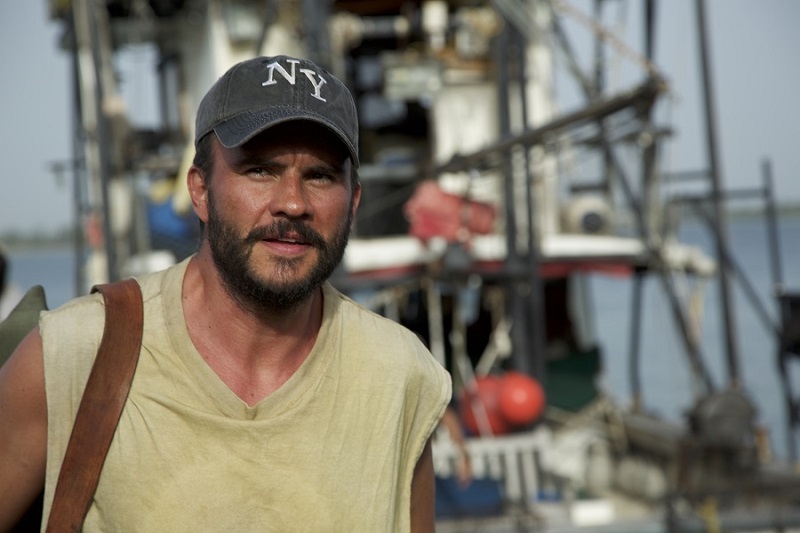
Did it feel like a natural transition to go from writing for the stage to writing for the screen? Are there any huge differences that must be addressed when doing so?
“As my first screenplay was a stage adaptation, I was completely naive as to the difference between the two mediums. I knew what worked on stage because it was tested hundreds of hours in front of an audience. However, I couldn’t account for the differences between the live and the projected experiences in pre-production.
It started to become clearer to me during the shoot that moving a story forward solely through dialogue leaves very little room for options later on in the editing room. You’re locked into significant story points through the written word and I found myself handcuffed to my own writing during the post process. Now, there is great value in the written word in both mediums, but film needs to have events that happen and are seen by the audience rather than events that happened and are relayed through dialogue.
After learning one hundred lessons in the post process, I better understood how to take advantage of my ability to write dialogue, but also how I could better move the story forward through the visual tools of film. I’ve now written as much as or more work for film and TV as I had for the stage. Yet I feel it has made me a sharper playwright because I have a stronger sense of moving the story through events while embracing the spoken word.”
“Don’t be diverted by the shiny objects around the industry. It still all comes down to looking at the person across from you and telling the truth. If it is projected onto a 50 foot screen, or if it is happening in a 20 seat theater. It’s the same truth.”
What would you say has been one of the biggest challenges you’ve had to face in your career so far?
“The entertainment industry is a business that thrives on creative ideas. Unfortunately, the business part of the process can destroy the creative spine, which is why I got into storytelling thirty years ago. It is a cliche to say, but Hollywood is full people who are not interested in telling stories, only interested in using the medium to make as much money as possible, regardless of what they tell you is their motivation. My biggest challenges have been trusting people whose real motives were to gain access to the people and assets I’d built through my creative work. I trusted too quickly and because of that, found myself starting over many times.”
And what has been one of your happiest career-related moments?
“During the making of Imprisoned, I worked with forty former and currently incarcerated men in Puerto Rico who had been model prisoners and had shown a deep desire to change. I did workshops with them prior to shooting and then was able to bring all of them onto the set and in front of the camera.
On September 8th, before premiering the film in theaters in Puerto Rico, we showed the film in front of 1000 incarcerated men and women in an unprecedented event sponsored by the Puerto Rican Correctional Office. We brought all of them to the center of a prison, gave them popcorn and soda, and projected the film on a large blow up screen. Not only were they profoundly appreciative, but three men watching that night got to see themselves on screen. The love and support they received from their fellow inmates moved me deeply and gave me one of the happiest nights of my creative life.”
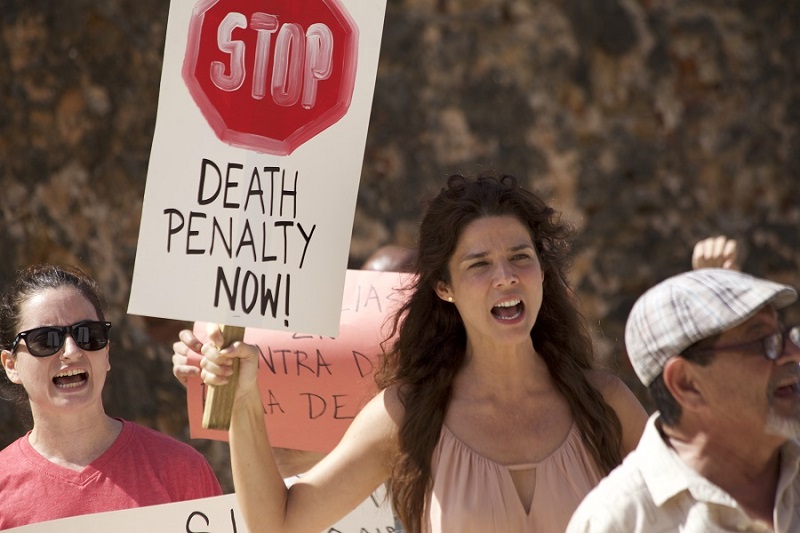
The variety of successful projects you have completed is super inspiring! Do you have any advice for the multi-passionate artists out there who are split between multiple talents, or maybe between wanting to pursue projects in both film and theatre?
“I first suffered from agents and mangers in Hollywood telling me that I had to focus on being an actor, or a writer or a director or a producer. I was told that without building visibility in one area, I couldn’t get a career going. I was also told that if I didn’t have an agent or manager to ‘build me up’ I wouldn’t have a way to make a living or reach any of my goals. I didn’t agree but it forced me to honestly make the choice to bet on myself or give over to fear and leave.
I took the leap and it has allowed me to never have to blame someone else for my failures. It also taught me that no one will ever care more for your ideas than you do yourself. It has kept me a bit protected from other people’s agendas and motivations. We all need collaborators and people who support our work in this industry. I just have learned to try to keep the circle around me small and look for people whose passion outweighs their need to get involved for financial reasons. Then we all can share in the success if we are so lucky, but keep focused on our collective goals.”
“Craft is your greatest asset. Cultivate it. Protect it. Honor it. This industry notices determined, disciplined, authentic actors.”
And as an acting teacher, do you have any advice for the young and aspiring actors out there?
“Teaching acting is a deep passion of mine. When I moved to Hollywood it was clear there were a lot of people who were using their alleged ‘industry relationships’ to entice people to pay for classes. I saw a lot selling actors on potential future opportunities rather than on the actual work needed to develop one’s craft. An actor must find his or her authenticity, build the imagination and learn the simplest means to communicating the largest ideas. When you pursue that commitment to your craft, you are less likely to get diverted into the ‘short cuts’ to success, which usually means someone selling you rather than building your instrument.
Craft is your greatest asset. Cultivate it. Protect it. Honor it. This industry notices determined, disciplined, authentic actors. Don’t be diverted by the shiny objects around the industry. It still all comes down to looking at the person across from you and telling the truth. If it is projected onto a 50 foot screen, or if it is happening in a 20 seat theater. It’s the same truth.”
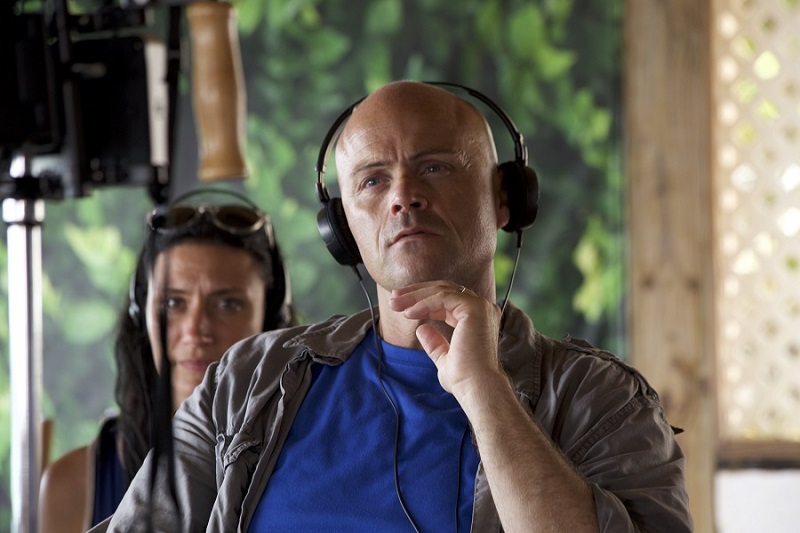
What’s next for you?
“I’m going to be producing a series of films back in Puerto Rico starting in the beginning of next year. The experience on the island as well as the working relationships that I developed during Imprisoned created a long-term plan for film production.
I’ve also co-created a television series with actor/producer Sid Mallya, which is moving forward as a co-production between companies in India and London.
I’m also going to be directing Harvest, a feature film that I wrote based on a very famous Serbian book, Johan’s Serbian Heart, followed by a TV series that continues a thread of the feature film into a serial format. This kind of project has never been before and I’m ready to leap into the unknown with my new producing partners in Eastern Europe.
However, I’m very excited to be producing and directing a new play of mine, October Surprise, that I hope to have in production the first part of 2020 in NYC. We are speaking with a number of Off Broadway venues and I hope to have the theater locked by the end of next month.”
What did you think of this interview with Paul Kampf?
Are any of you working as or aspiring to be a writer or director? We’d love to hear all about what you’re up to in the comments below! In the meantime, you can check out even more of our interviews with inspiring people in the theatre industry!
Learn More:
Want to stay in the loop with all things related to musical theatre?
Author: Stacy Karyn
Stacy Karyn is the founder of Theatre Trip, author of The Thespian’s Bucket List, and creator of The Cast Album List. She holds a BA in theatre, a TESOL drama certificate, and has worked and interned with Broadway and Off-Broadway theaters.

